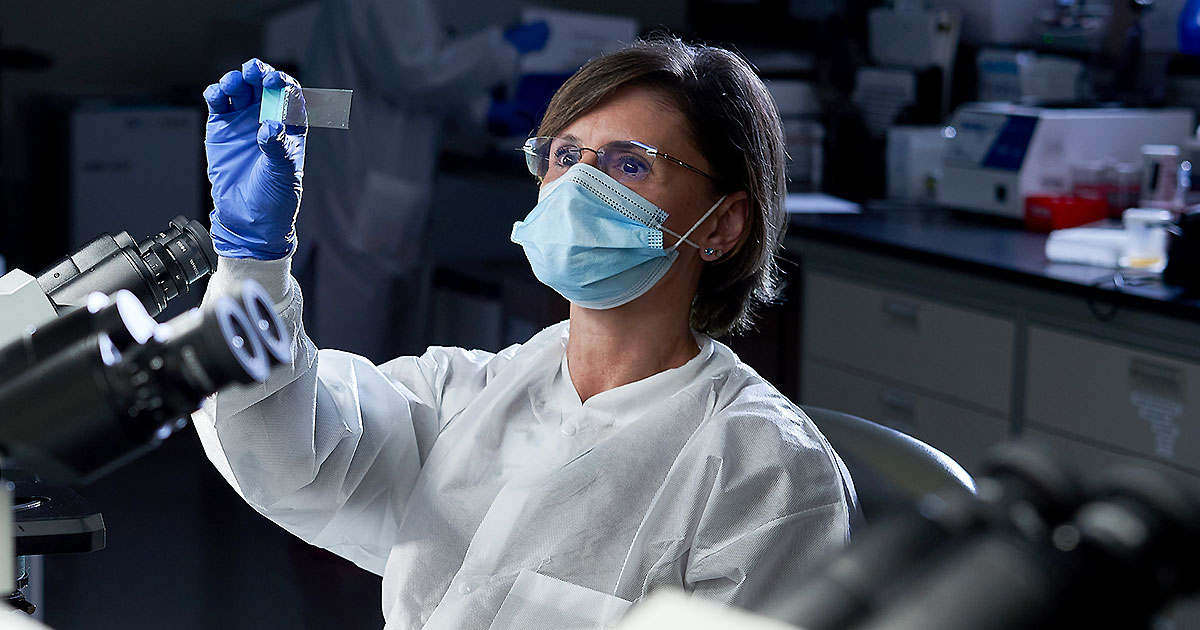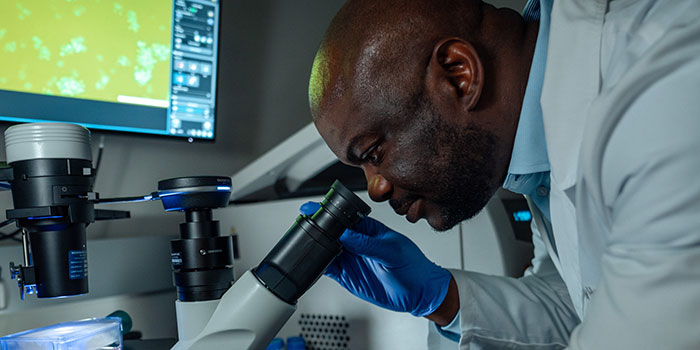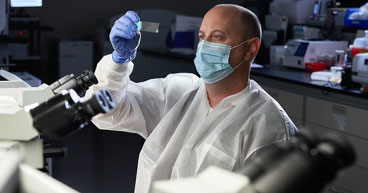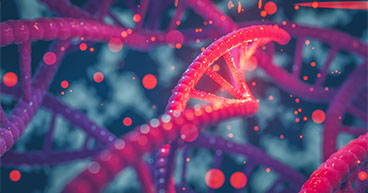
Help is on the horizon for patients diagnosed with hard-to-treat blood cancers. New therapies are available to bolster the immune system by using novel engineered antibodies that handcuff cancerous cells to disease-fighting T-cells.
These bispecific antibodies, which are not found in nature, work by attaching to two different antigens, either on separate cells—connecting a cancer cell to an immune system cell—or on an individual cancer cell, disrupting the cancer’s signaling pathways.
In December 2022, the U.S. Food and Drug Administration (FDA) gave accelerated approval to mosunetuzumab-axgb (Lunsumio®) for adult patients with relapsed or refractory follicular lymphoma whose cancer had recurred or worsened after receiving two prior rounds of therapy. Mosunetuzumab is the first bispecific antibody approved to treat non-Hodgkin lymphoma.
That authorization followed the FDA’s October accelerated approval for teclistamab (Tecvayli®), a bispecific antibody that binds to a CD3 receptor protein on the surface of a T-cell and to a B-cell maturation antigen (BCMA) on the surface of a multiple myeloma cell.
These recent entries build on the success of the bispecific antibody drug blinatumomab (Blincyto®), which received full FDA approval in 2017 for the treatment of relapsed or refractory B-cell precursor acute lymphoblastic leukemia (ALL) in adults and children. In 2018, the FDA expanded that approval to treat minimal residual disease-positive B-cell precursor ALL.
In May, 2023, the FDA approved epcoritamab-bysp (Epkinly®) to treat some forms of diffuse large B-cell lymphoma.
Researchers hope the advancement of bispecific antibodies will lead to more treatment options for blood cancers that have a high risk of relapse, provide sustained disease control, while allowing for patients to be treated on an outpatient basis and preserving quality of life while effectively targeting the cancer cells.
“Compared to the use of cytotoxic chemotherapy drugs, where the gains you get, unfortunately, are paid back with toxicity many times over, with bispecifics you can kind of have your cake and eat it too,” says Jeremy T. Larsen, MD, Hematologic Oncologist , who has treated several patients with bispecific antibodies at City of Hope Phoenix. “These agents work very well and are generally well tolerated. These are big breakthrough drugs and will be be transformative from a patient standpoint.”
In this article, we’ll take a closer look at bispecific antibodies. Topics include:
- Engineering antibodies
- What are bispecific antibodies?
- What are the benefits of bispecific antibody treatment?
- A case study
- What’s on the horizon for bispecific antibodies?
If you’ve been diagnosed with a blood cancer, such as leukemia, lymphoma or multiple myeloma, and have questions about your treatment plan, or you’re interested in a second opinion on your diagnosis, call us or chat online with a member of our team.
Engineering antibodies
Antibodies are produced by the immune system to protect against disease by attacking and killing foreign invaders, such as viruses. Protein components that circulate in the blood, they’re made by white blood cells called B-cells and plasma cells.
The manufacture of antibodies that help the body attack diseased cells is a major focus of cancer research today. Scientists have learned how to engineer antibodies in the lab using proteins from mice and/or humans. When given to a cancer patient, these new antibodies are designed to help the patient’s own immune system recognize and destroy cancer cells, or to carry toxic agents directly to those cells.
In cancer immunotherapy, a monoclonal antibody is designed to attach directly to a specific antigen on a cancer cell, thereby triggering an immune attack and cell death
Some monoclonal antibodies are designed to carry cell-killing payloads directly to cancer cells. These targeted therapy drugs include antibody-drug conjugates (ADCs) that pair a monoclonal antibody with a cytotoxic drug, or antibody-radionuclide conjugates (ARCs) that have a radiation drug payload. These targeted therapies attempt to limit the collateral damage to healthy cells caused by traditional chemotherapy or a more standard radiation therapy.
Another area of antibody therapy for cancer treatment is chimeric antigen receptor (CAR) T-cell therapy. CAR T-cells are developed with a complicated individualized process using T-cells from the patient’s own immune system that are adapted to better fight the cancer. The T-cells are harvested, modified, multiplied and then returned to the patient’s body to lead a more effective attack on the cancer. Not all hospitals are equipped or have trained staff to provide the therapy.
Some researchers think bispecific antibodies may offer a more practical avenue for treatment for many patients than CAR T-cells and may reduce the severity of potential side effects. While bispecific antibodies are also being researched for use against solid tumors, their most promising results so far have involved the treatment of blood cancers such as leukemia, lymphoma and multiple myeloma.
What are bispecific antibodies?
Unlike a monoclonal antibody, a bispecific antibody is made up of the halves of two separate antibodies that have been engineered into a single molecule, allowing it to attach to two separate antigens. While the idea behind bispecific antibodies has been around since the 1950s, it wasn’t until the 1990s that practical ways were developed—such as a puzzle-piece-fitting approach called “knobs-into-holes” technology—for fusing their separate components.
The first cancer-fighting bispecific antibodies have been designed to attach both to a cancer cell antigen and to an immune system T-cell antigen.
“With patients, I often use the analogy of a chaperone at a dance, where it's basically grabbing the T-cell with one arm and then grabbing a unique marker on the cancer cell with the other and bringing those two together,” Dr. Larsen says.
Instead of just making it easier for the body’s own immune system to recognize the cancer cells, these T-cell-redirecting antibodies improve the chance for a successful attack by bringing the body’s own disease-fighting cells directly into contact with cancer cells, basically handcuffing them together with a flexible linker peptide.
"It's like putting a pair of glasses on to the T-cell so that it’ll be able to recognize one's own lymphoma cells," Elizabeth Budde, MD, PhD, Associate Professor in City of Hope's Division of Lymphoma in the Department of Hematology & Hematopoietic Cell Transplantation, told ABC7 in Los Angeles.
Blinatumomab, teclistamab and mosunetuzumab are examples of these bispecific T-cell engagers (BiTEs). Blinatumomab, for example, fights B-cell malignancies by binding to the CD19 protein on the surface of cancerous B-lineage cells and to the CD3 protein on T-cells.
“The good and bad cells are pulled together, with mosunetuzumab serving as a kind of bridge,” Dr. Budde says. “Being in such close proximity allows the now-activated immune T-cells to specifically recognize, attack and eliminate the lymphoma cells.”
It's not only the proximity of the cancer and T-cells at work in bispecific antibody treatments. Activating the T-cells triggers the release of immune substances called cytokines, which then attract other immune cells—such as macrophages and natural killer cells—to the tumor target, Charles Sentman, PhD, of the Geisel School of Medicine at Dartmouth University, told ASH (American Society of Hematology) Clinical News.
Researchers are also developing bispecific antibodies that attach to two different antigens on a single tumor cell. With monoclonal antibodies, the cancer cell’s ability to find an alternate signaling pathway may lessen the antibodies’ ability to block the cancer cell’s signaling pathway. By blocking two related signaling pathways on a cancer cell instead of just one, the bispecific antibody may be able to reduce the tumor’s drug resistance, improve the anti-cancer effect and impede the development of immune escape mechanisms that allow the cancer to evade the body’s immune response.
Bispecific antibodies must be engineered in laboratories because they’re not found in nature. As of March 2022, nine bispecific antibodies had been approved for use worldwide, with more than 180 in preclinical development and more than 50 in clinical trials, according Biopharma PEG, a biotechnology-oriented company in Massachusetts.

What are the benefits of bispecific antibody treatment?
One advantage bispecific antibodies have over CAR T-cells is that they’re made “off the shelf”—meaning they don’t require any of a patient’s existing cells to make, so patients don’t have to travel to designated sites and undergo medical collection procedures before the modified immune cells can be manufactured. Treatment doesn’t have to be delayed by the collection and manufacturing process, nor is it dependent on the patient’s ability to handle the required medical procedures.
A major concern with CAR T-cell therapy is cytokine release syndrome (CRS), a side effect caused by the rapid release of a large amount of cytokines into the bloodstream. CRS symptoms may range from mild flu-like symptoms—such as fever, nausea, headache, rash, rapid heartbeat, low blood pressure and trouble breathing—to potentially life-threatening anaphylactic shock.
Researchers believe that CRS will produce fewer serious events when bispecific antibodies are used. In the mosunetuzumab study, almost all cases of CRS that did occur were low grade and lasted a short time (an average of three days). No late-onset or chronic toxicities were observed, the Leukemia and Lymphoma Society reported.
“I think there is a role for both bispecifics and CAR T therapy,” Dr. Larsen says. “But one of the big advantages to bispecifics is that they are off-the-shelf drugs you can prescribe and the patient is on it the next week. With CAR T, there may be several months of waiting time. So, for patients who don't have immediate access to a CAR T facility, these bispecifics are now kind of a no brainer.”
A case study
For San Diego postal worker Juan Yee, the bispecific antibody drug mosunetuzumab came along at just the right time.
Yee, 49, was diagnosed with follicular lymphoma in 2012 and relapsed in 2016. In both cases, he was considered “in remission” after multiple rounds of chemotherapy.
"It's a lymphoma that we can get into remission now using chemotherapy treatment, but it will come back," Dr. Budde told ABC7.
When Yee’s lymphoma resurfaced in 2018, he was ready to call it quits. “I couldn’t go through chemo again,” he told ABC7. He didn’t have to. Yee heard about the new drug in clinical trials, and his oncologist recommended he see Dr. Budde.
“My doctor said he had read about the new medication they were testing at City of Hope, and it seemed really promising,” he said.
So far, it’s been more than that. Yee says his treatments were easy, compared to his previous chemotherapy regimens. His side effects included some brief spikes in blood pressure and mild fatigue.
"I was happy,” he told ABC7. “Since Day One, I didn't feel anything. The swelling of the lymph nodes went down right away. I was surprised.
“I wouldn't have a chance to see my grandson if I had given up,” he added. “Don't give up. There's always something there to help you,"
Shortly after Yee’s participation in the clinical trial for mosunetuzumab, the FDA granted accelerated approval for the drug to treat follicular lymphoma.
“Thanks to Juan’s participation, along with other brave patients, our study demonstrated that a pure immune therapy based on bispecific T-cell-engaging technology is proving to work very well with high response rates—and safely—in blood cancer patients who need more effective therapies and with fewer side effects,” Dr. Budde says.
What’s on the horizon for bispecific antibodies?
Besides the recent approval of teclistamab to treat multiple myeloma, the FDA in December gave another bispecific antibody “Breakthrough Therapy Designation” status for treating multiple myeloma. Pfizer Inc.’s elranatamab is designed to bind to B-cell maturation antigens, which are found on the surface of multiple myeloma cells, and to CD3 receptors on the surface of T-cells.
Other bispecific antibody drugs now in clinical trials show promise as potential treatments for several types of non-Hodgkin lymphoma, chronic lymphocytic leukemia and multiple myeloma, with many of these investigational agents targeting novel markers on cancer cells. Studies investigating the combination of bispecific antibodies to attack the cancer cell on multiple fronts are underway and may ultimately prove to be another successful strategy to overcome resistance to therapy. In one recently reported phase 1b study, RedirecTT-1, patients with relapsed/refractory multiple myeloma treated with teclistamab and talquetamab in combination (currently under review by FDA) achieved a 96.3 percent response rate.
“Data from clinical trials now show that bispecific antibodies can achieve responses in patients who have previously received CAR T-cell therapy, as well as in patients who have never received CAR T-cells, those who are heavily pretreated, those who are chemo-resistant, and those who relapsed soon after treatment,” Dr. John N. Allan, an assistant professor of medicine in the division of hematology and medical oncology at Weill Cornell Medicine, said in an interview published in August in Clinical Advances in Hematology & Oncology. “Thus, this class of drugs holds a lot of promise to begin addressing these unmet needs.”
If you’ve been diagnosed with a blood cancer, such as leukemia, lymphoma or multiple myeloma, and have questions about your treatment plan, or you’re interested in a second opinion on your diagnosis, call us or chat online with a member of our team.



